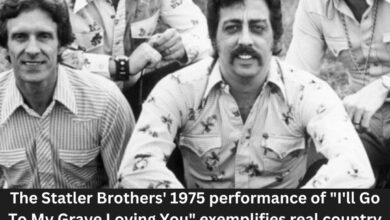Elvis Presley’s Legendary “If I Can Dream” Performance From The ’68 Comeback Special
Elvis Presley’s performance of “If I Can Dream” during his landmark ’68 Comeback Special remains one of the most defining moments in the annals of music history. This special, which aired in December 1968, was more than just a television event; it represented the revitalization of Elvis’s career. After several years of focusing primarily on his film career, the special marked his powerful return to live performance. The timing of this comeback could not have been more significant, as America was undergoing a time of social upheaval, civil rights struggles, and profound cultural shifts.
The song “If I Can Dream,” written by Walter Earl Brown, was inspired in part by the civil rights movement and the universal themes found in Martin Luther King Jr.’s “I Have a Dream” speech. This connection imbued the performance with deep social significance, allowing Elvis to address not only his fans but also the wider societal issues of his time. The lyrics reflect aspirations for peace, love, and understanding amidst turmoil, themes that resonated powerfully during the late 1960s. It was a moment when music could serve as a voice for hope, and Elvis’s passionate delivery reinforced the gravity of these sentiments.
In his performance, Elvis appeared in a striking black leather outfit that became emblematic of his raw energy and charisma. Accompanied by a full orchestra, this arrangement lent an intense emotional weight to the song. His vocal delivery was steeped in conviction and urgency, capturing the hearts of viewers and listeners alike. The sheer power of his voice, combined with the arrangements, created an unforgettable performance that struck a chord with an audience grappling with real-world issues. This combination of high artistry and emotional authenticity has allowed this moment to stand the test of time, ensuring that it remains a pivotal reference point in discussions about Elvis’s illustrious career.
The ’68 Comeback Special itself was a milestone for Elvis. It broke away from the traditional formats of television musical presentations of the time, showcasing his compelling stage presence and vocal talent in a dynamic and contemporary setting. Featuring other classic songs, the special introduced Elvis to a new generation of fans who may have been unfamiliar with his earlier work. It became a cultural touchstone, reminding viewers and listeners of his enduring significance in music history and popular culture.
Fast forward to 2015, and the song “If I Can Dream” was revisited in a remarkable way. The Royal Philharmonic Orchestra recorded new arrangements of Elvis’s original vocals, breathing fresh life into his classic hits. This project was coordinated by Priscilla Presley, who recognized the potential to connect contemporary audiences with Elvis’s timeless music. The recording took place at the iconic Abbey Road Studios, a location synonymous with musical excellence, and the collaboration with noted producers Don Reedman and Nick Patrick ensured that the new renditions honored Elvis’s legacy while appealing to modern sensibilities.
This album, titled “If I Can Dream: Elvis Presley with the Royal Philharmonic Orchestra,” not only featured “If I Can Dream” but also included other beloved tracks, reinterpreted with grand orchestral support. This modern revival of Elvis’s work underscores the artist’s rich musical catalog, demonstrating that his messages of love and peace continue to resonate profoundly in a world that still grapples with similar themes. The album’s release served as a reminder that, despite the passage of time, Elvis’s music remains relevant as it touches on universal human experiences.
Born on January 8, 1935, in Tupelo, Mississippi, Elvis Presley was a child of the American South with a passion for music that would eventually lead him to alter the course of musical history. His unique blend of musical genres—country, blues, and rock ‘n’ roll—transformed the landscape of popular music in the 20th century. Graced with a distinctive voice and magnetic stage presence, Elvis attracted a wide audience and became an icon whose influence transcends generations.
Throughout his career, Elvis received numerous accolades acknowledging his contributions to music, including multiple Grammy Awards and the posthumous Presidential Medal of Freedom, one of the highest civilian honors in the United States. His untimely death on August 16, 1977, at the age of 42 shocked the world, but his legacy has flourished in the years since. His music continues to inspire artists and entertain listeners globally, as it remains a vital part of American culture.
Elvis’s former home, Graceland, has become a pilgrimage site for fans, drawing millions of visitors each year who wish to connect with the life and music of the man known as the King of Rock ‘n’ Roll. The palpable excitement experienced within its walls speaks to the gratification found in immersing oneself in Elvis’s world, where music and identity coalesce.
The enduring relevance of “If I Can Dream” resonates beyond its original context, echoing the hopes and dreams of every generation striving for a better future. Whether in the performance during the ’68 Comeback Special or in the orchestral reimaginings, the song symbolizes the timeless pursuit of peace and understanding, serving as a reminder that the messages embedded in music can transcend time and continue to inspire change. Elvis Presley’s artistry, characterized by its passionate cry for unity, remains as meaningful now as it did when he first took the stage, ensuring that his spirit continues to guide and uplift.





